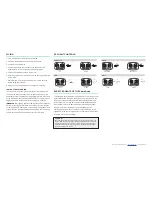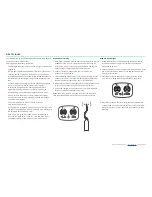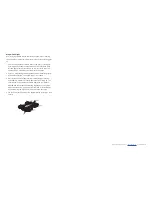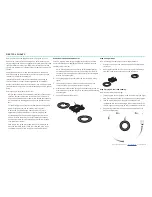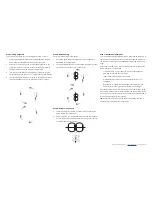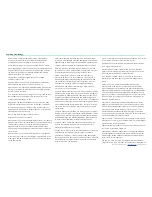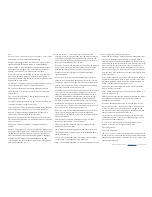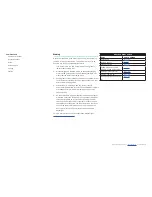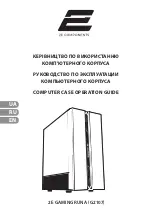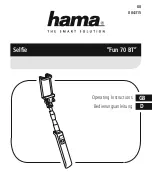
For more product information visit |
www.FatShark.com
| All Rights Reserved
axis.
• Gimbal- 1. Two or three axis stick on a controller 2. Two or three
axis camera mount for stabilized video footage
• Goggles- Video goggles use micro display(s) to show a video
signal in a headset, otherwise known as a video headsets.
• Ground station- A ground based assembly designed to support
equipment. These might include a video receiver, antennas,
batteries, video monitor, etc. Often set up on a tripod.
•
Hover- When the forces of lift and gravity and all torque forces
are properly balanced, a drone or helicopter can maintain its
position in space. Maintaining fine control while holding position
and altitude is called a hover.
•
Hover Power- The amount of power it takes to produce enough
lift to counteract the weight of the aircraft and hover.
•
IPD- Inter-pupillary distance- distance between one’s eyes
• Linear antenna- These antennas are simple with reasonable
performance.
•
LiPo- Lithium Polymer battery- energy dense batteries that
deliver high performance.
•
Loop times- Determines how many times per second the flight
controller calculates the PID control loops.
• LOS- Line Of Site- Refers to the direct line between an observer
and an object, where the object is visible to the naked eye.
•
Multi-GP- Grassroots racing organization with chapters in
virtually every metropolitan area across the US.
•
Multicopter- A flying aircraft that balances the forces of two or
more propellers to maintain controlled flight with no other flying
or control surfaces.
•
Multishot- A PPM sum signal which operates faster than
oneshot.
•
MultiWii- Original open source project to make a flight controller
for a quadcopter. Original project utilized an Arduino paired with
the IMU sensors from a Nintendo Wii controller. Subsequent
branches of the project have included BaseFlight, Cleanflight,
Betaflight, and Raceflight* (*Raceflight began with open
source based code, but they have moved to a proprietary code
base with Raceflight One)
•
Nose in and Nose out- These terms come from the model
helicopter community and describe how the model is oriented
from the pilot’s perspective. When the model is “nose in” the
model is pointed at the pilot, and when the model is “nose out”
the model is pointed away from the pilot.
•
NTSC/PAL- Analog video standards, NTSC is for North America,
PAL is used in most other areas around the world. Fat Shark
headsets automatically select which mode is being used.
•
Oneshot- a PPM sum signal which operates faster than
conventional PPM
• Open source- projects which are available to the internet for
free, with the understanding developers will receive credit, etc.
• Orientation- Refers to the quadcopter’s position relative to the
operator for 3rd person RC. Refers to the ability to understand
the aircraft’s location in space in FPV flight
• Oscillation- a back and forth movement which could take place
on any or all axis of the aircraft during flight. Oscillations of
different frequencies and magnitude indicate different issues
with setup. Oscillations are a normal part of the tuning PID
tuning process as the limits of the gain values are explored.
Oscillations can also result from an operator over-controlling
a vehicle, and can happen in cars, airplanes, helicopters, or
virtually any control system when the operator starts to chase
the control inputs with too large of a response.
• OSD- On Screen Displays generate graphics on top of a video
signal. This could be as simple as a name/callsign being
displayed, or as complicated as a full instrument panel packed
with telemetry data.
•
PCB- Printed Circuit Board, a fiberglass board with copper
layers, this is the “chassis” for circuit boards.
•
PDB- Power Distribution Board, used to manage electrical
distribution on a quadcopter
•
PID- A method of augmenting stability, PID control loops are
calculations used by the flight controller to create a balance of
control and stability.
•
PPM- Pulse Position Modulation, a sum signal that combines
multiple PWM control signals on one signal wire.
•
PWM- Pulse Width Modulation, a method of adjusting the pulse
width of a signal to provide discreet control.
•
Rate mode (Acro mode)- A flight mode where the aircraft will
not return to level flight when the stick is centered, but will
maintain the attitude it was commanded to. Flip and roll rates
are determined by how far the control stick is deflected, moving
the stick a small amount away from center will result in the
aircraft continuing a slow rotation. Moving the control stick to
the extremes will result in the aircraft continuing to rotate fast
(how fast the aircraft rotates with full stick input is determined
by the rate settings).
• Rates- Determines how quickly the aircraft rotates in each axis.
Sometimes values are adjusted to a scale from 0-100 or 1-150,
sometimes Rates are determined with a measured maximum
rotation rate defined as degrees per second.
• Rx- Receiver that picks up the control commands and sends
them to the flight controller.
• Serial- A serialized data stream which can be transmitted on a
single transmission wire
• Stability- Refers to the aircrafts inherent tendencies to maintain
a commanded course and how smooth and accurately it
responds to control inputs.
• Telemetry- sending data remotely. In this case telemetry is a
communication conduit for the quadcopter to report back on
a variety of metrics. Common telemetry data might include
how well the control receiver is picking up the signal, what the
battery condition is, what the altitude is, etc.
•
Tiny-Whoop- Micro racing drones with ducted fans, defined
as being “punch safe” or cannot carry enough energy to hurt a
person if it hits them in the face.
• Tx- Transmitter that pilot holds and manipulates a pair of
gimbals to transmit control signals to the drone.
• VRX- video receiver
• VTX- video transmitter
•
Yaw, pitch, roll. Yaw is when the aircraft spins or rotates about a
vertical axis. Pitch is when the aircraft tilts forward or backward
about a Horizontal axis. Roll is when the aircraft tilts side to side
about a lengthwise axis.




